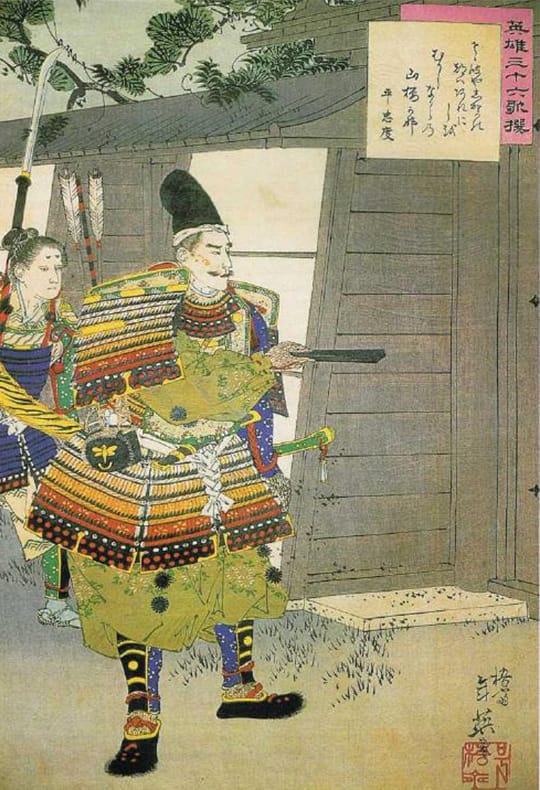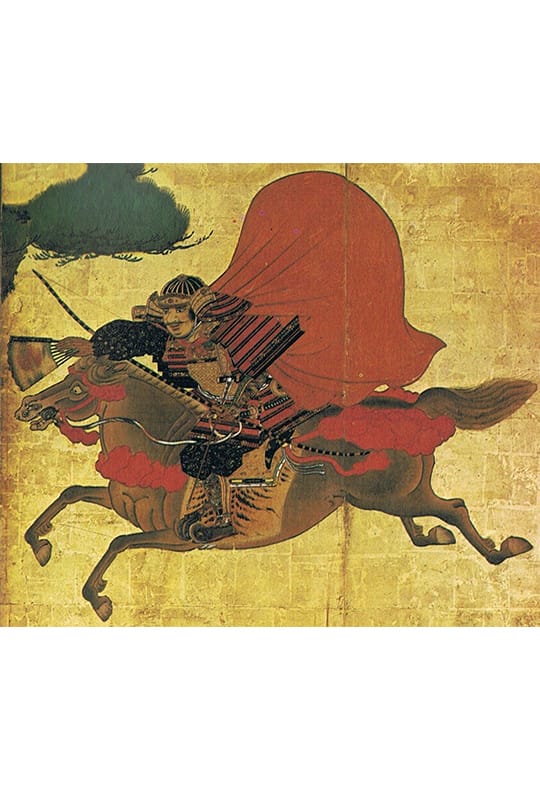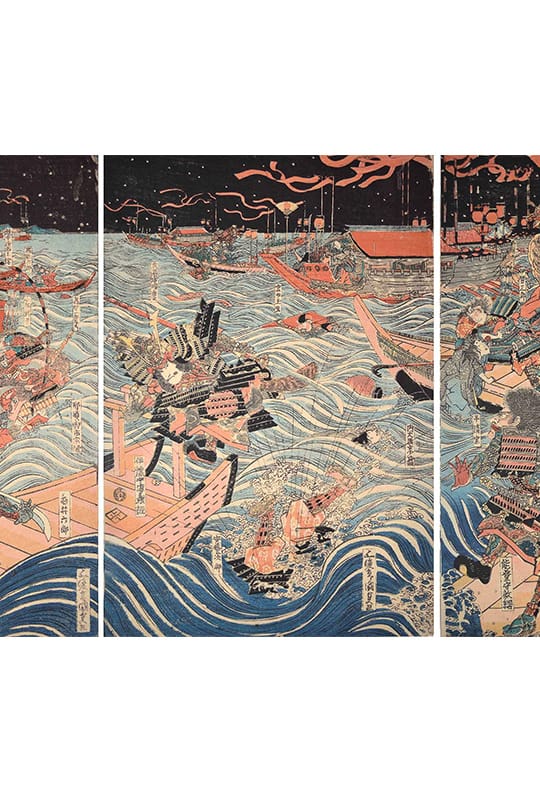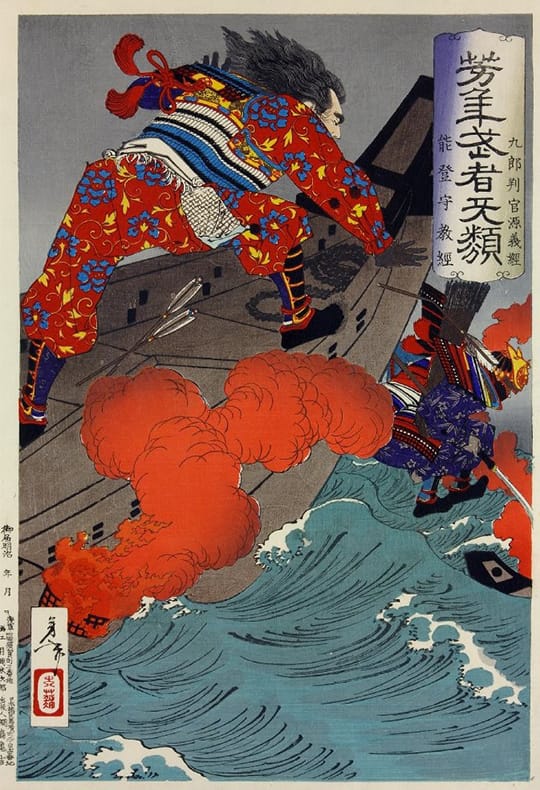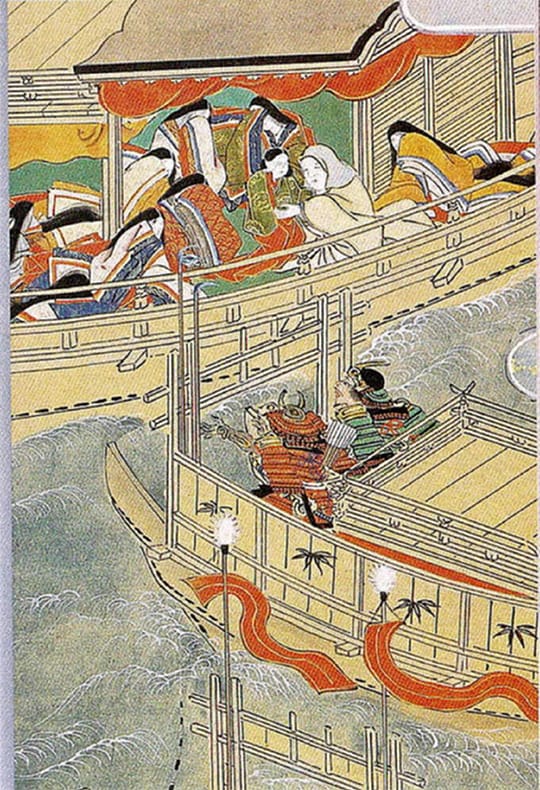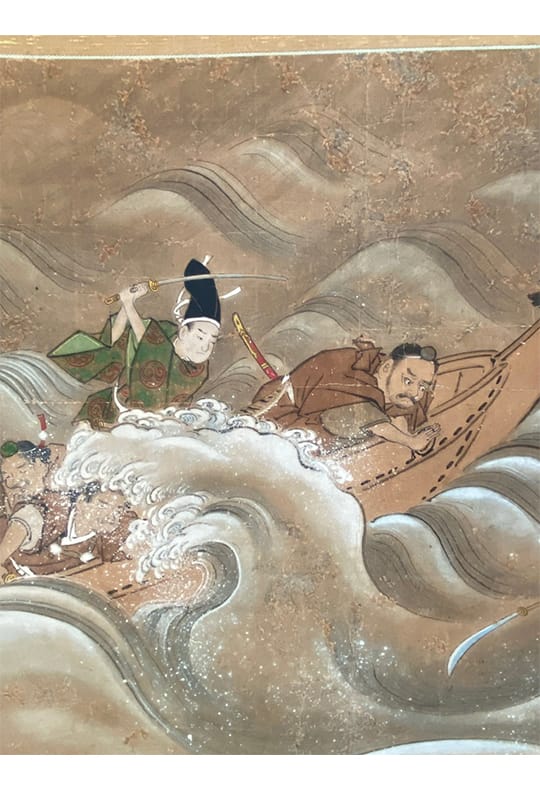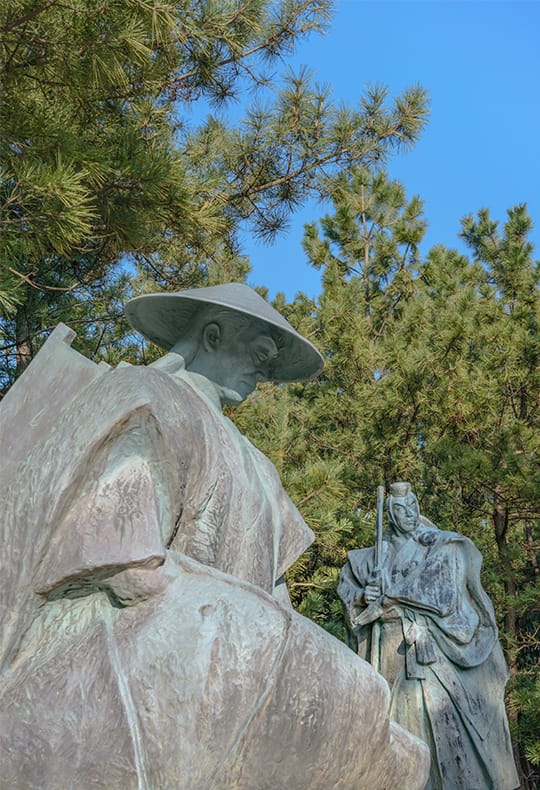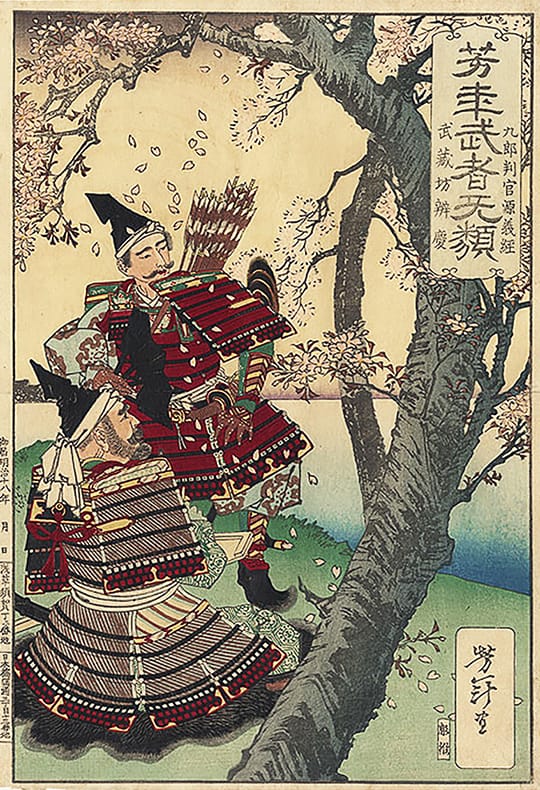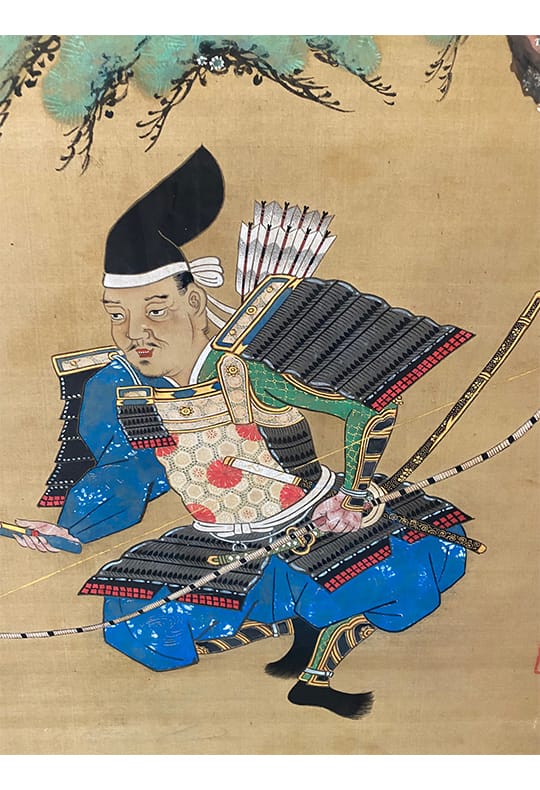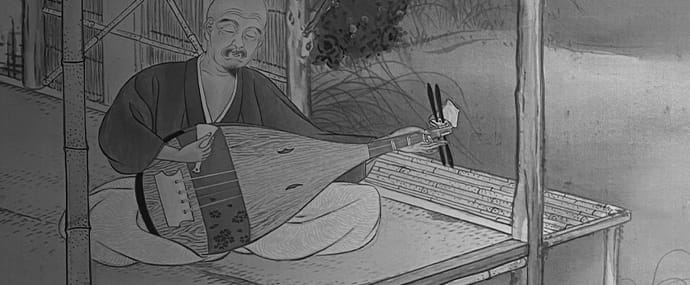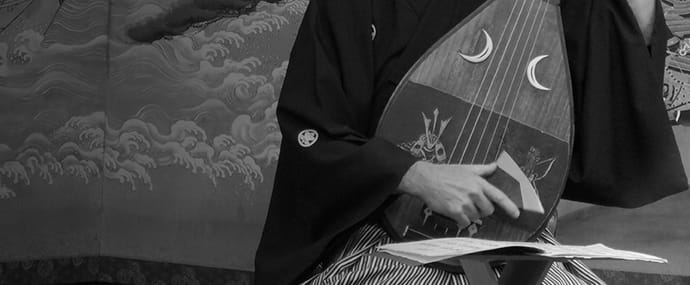The Tale of the Heike-search

nasu no yoichi
那須与市
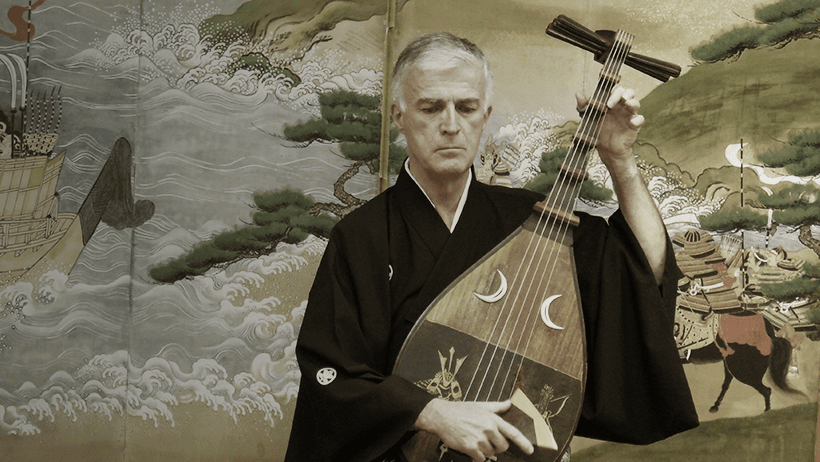
Introduction
The Tale of the Heike (HM) contains many episodes from the war between the HEIKE and the GENJI on the island of Yashima, the most famous one assuredly being the story of NASU no Yoichi. Outside of this episode in the HEIKE epics, however, there are no other sources providing more information about this skillful young archer. In the HM the shooting is merely a report, and only in later periods was the story was retold in a more artistic way. The chikuzen biwa ballad adheres to the 15th century text, but only the last section omitted.
The reason for this omission is obvious: the chikuzen biwa ballad ends in a bright finale with both armies praising the archer and his skill. But when NASU no Yoichi had accomplished his task, Yoshitsune commands Yoichi to use one more arrow and shoot the HEIKE warrior on the boat celebrating the extraordinary fan-shot. NASU no Yoichi also hits this human target. All warriors on both sides consider this needlessly cruel, and the festive mood is instantly destroyed. The horrors of war have returned.
Synopsis
The GENJI and the HEIKE had a number of military clashes on the island of Yashima, In the late afternoon after the Battle of Yashima (see the ballad Yashima), the GENJI on shore and the HEIKE on the sea had decided to end the day’s fighting. Suddenly, a ship from the HEIKE fleet approached with a fan fixed on a pole near the prow and a lady-in-waiting dancing on the deck. Yoshitsune, the commander-in-chief of the GENJI wondered what this could mean. HIs kinsman interpreted this as a challenge to the GENJI: to produce an archer from their troops capable of hitting this distant target.
Yoshitsune asked his confidants who could fulfill this task. He finally summoned NASU no Yoichi, a young warrior with an excellent reputation as an archer, and ordered him to shoot the fan. NASU no Yoichi, however, recognized instantly that the requested shot was impossible and recommended Yoshitsune to find a better archer. Yoshitsune became angry and replied that if he refused, he could return home immediately. With this, NASU no Yoichi understood that he had no choice. He rode his horse to the shore and walked it ten meters into the water to get as close to the target as possible. A strong wind was blowing and the waves were high. Yoichi prayed to the god of war and the gods of his homeland to calm the waves. His prayer was heard, and the wind subsided allowing Yoichi to aim at the fan. With a single shot, he hit it, and thus fulfilled the challenge presented by the Heike. Both the GENJI and the HEIKE responded enthusiastically to NASU no Yoichi’s remarkable feat of archery. In their joy, the GENJI struck their quivers and the HEIKE smote their weapons on the planking of their ships. The ballad ends with a hymn of praise for the unrivaled NASU no Yoichi.
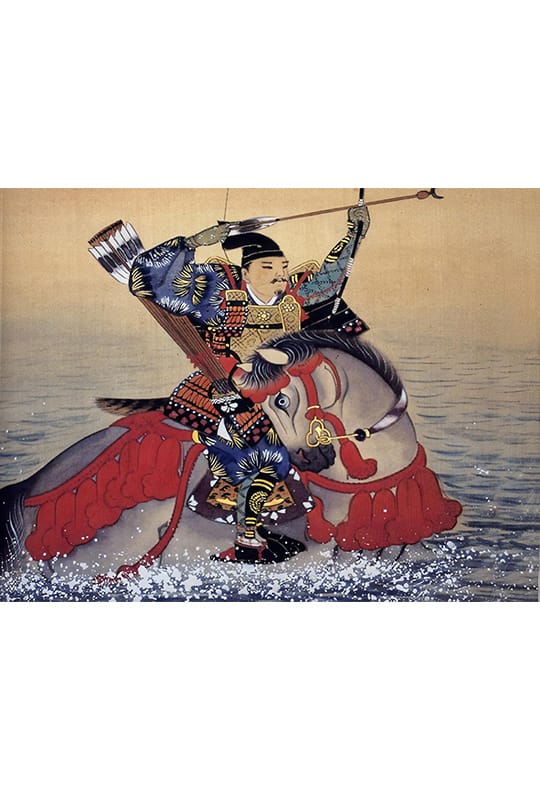
Lyrics
-
1. Fighters in Awa Sanuki who had turned against the HEIKE Kämpfer, die in Awa Sanuki sich von den HEIKE lösten
Awa Sanuki ni HEIKE o somukite 阿波讃岐に平家を背きて
-
2. and were waiting for the GENJI troops und zur GENJI-Seite überwechseln wollten,
GENJI o machikeru tsuwamono domo 源氏を待ちける兵ども
-
3. descended from peaks here and from caverns there, rannten von den Hügeln und aus Höhlen da und dort.
asoko no mine koko no hora yori 彼処の峰こゝの洞より
-
4. formed groups of 14, 15 or 20 men In Gruppen von nur 14, 15 oder 20 Mannen
jūshigoki nijikki uchitsure uchitsure 十四五騎廿騎打連れ打連れ
-
5. and assembled on their fast horses. stürmten sie herbei.
hasekitaru hodo ni 馳せ来るほどに
-
6. Hōgan’s (Yohsitsune’s) force quickly numbered 300 warriors. Hōgans (Yoshitsunes) Truppe zählte bald 300 Reiter.
Hōgan hodo naku sanbyaku yoki ni naritamainu 判官程なく三百余騎になり給ひぬ
-
7. “Night is falling, “Dunkel wird es,
kyō wa higurenu 今日は日暮れぬ
-
8. it is impossible to settle things today.” heute kann nichts mehr entschieden werden.“
shōbu o kessubekarazu tote 勝負を決すべからずとて
-
9. and both sides withdrew. Als sich Freund und Feind zurückgezogen hatten,
GENPEI tagai ni hikishirizoku tokoro ni 源平互に引き退く所に
-
10. Then a small, nicely appointed boat kam ein kleines, hübsch geschmücktes Schiff
oki yori jinjō ni kazattaru kosen issō 沖より尋常に飾ったる小船一艘
-
11. moved shoreward from the open sea. zum Ufer hin gerudert.
migiwa e mukaite kogiyose 汀へ向ひて漕ぎ寄せ
-
12. When it had approached a point 250 to 300 feet from shore Etwa hundert Meter weit entfernt vom Festland
nagisa yori hichihattan bakari ni mo narishikaba 渚より七八段許りにもなりしかば
-
13. it swung broadside. drehte es sich seitwärts.
fune o yokozama ni nasu 船を横様になす
-
14. The GENJI were puzzled when Alle GENJI-Krieger staunten, als sie sahen,
are wa ika ni to miru tokoro ni あれは如何にと見る所に
-
15. from the inside of the ship wie aus der Kajüte
fune no naka yori 船の中より
-
16. an elegant court lady, 18 or 19 years of age, emerged. eine junge Frau von 18 oder 19 Jahren trat.
toshi no yowai jūhakku bakari naru nyōbō no 年の齢十八九許りなる女房の
-
17. She wore ample red trousers and a robe of willow-green. Sie trug ein faltenreiches weidenfarbiges Gewand mit roter weiter Hose.
yanagi no itsutsu ginu ni kurenai no hakama ”kitaru ga 柳の五つ衣に紅の袴着たるが
-
18. She took out a pole surmounted by a red fan with a golden sun design Einen roten Fächer mit der „hinomaru“-Sonne steckte sie
mina kurenai no ōgi no hi idashitaru o 皆紅の扇の日出したるを
-
19. and wedged it between the prow and the planking. auf einen Pfahl, den sie am Bug befestigte
fune no segai ni hasamitate 船の背櫂に挟み立て
-
20. Facing the land, she beckoned to the GENJI. und winkte dann den GENJI zu.
kuga e mukatte zo manekikeru 陸へ向ってぞ招きける
-
21. Kurō Hōgan Yoshitsune Kurō Hōgan Yoshitsune
Kurō Hōgan Yoshitsune wa 九郎判官義経は
-
22. summoned GOTŌ Byōe Sanemoto rief nach GOTŌ Byōe Sanemoto
GOTŌ Byōe Sanemoto o meshite 後藤兵衛実基を召して
-
23. “What is that all about?” he asked. “Was soll das denn nur?“ erkundigte er sich.
are wa ika ni to notamaeba あれは如何にと宣へば
-
24. “She seems to be inviting us to shoot at it. “Es sieht so aus, als forderten sie einen Fächer-Schuss heraus.
ōgi o iyo to ni koso sōrōrame 扇を射よとにこそ候らめ
-
25. Should, however, your Lordship advance within arrow’s range Doch wenn mein Herr sich selber vorwagt,
tadashi taishōgun no yaomote ni susunde 但し大将軍の矢面に進んで
-
26. to look at the fair lady, um die junge Schöne anzuschauen,
keisei o goranzeraren tokoro o 傾城を御覧ぜられん所を
-
27. they might ask an expert archer to shoot you. könnte er zum Ziele eines Schützen werden.
tedare ni nerōte iotose yo to no 手足に狙ふて射落せよとの
-
28. This could be their plan, but still, Möglich, dass dies eine üble List ist;und so würde ich empfehlen,
hakarigoto to koso zonji sōrae 計略とこそ存候へ
-
29. you probably should order someone to shoot the fan.” dass ein Bogenschütze auf den Fächer schießt“,
sari nagara ōgi o ba isaserarubyō mo ya sōrōran to さり乍ら扇をば射させらるべうもや候らんと
-
30. Sanemoto said. Hōgan then asked, sprach Sanemoto, worauf Hōgan fragte:
mōshikereba Hōgan 申しければ判官
-
31. “Is there someone in our force “Gibt es unter unsern Leuten
mikata ni itsubeki jin wa 味方に射つべき仁は
-
32. who can hit it?” einen, der den Fächer treffen kann?“
tare ka aru to toitamaeba 誰かあると問ひ給へば
-
33. “We have many good archers, “Wir haben viele gute Schützen,
tedaredomo ōku sōrō naka ni 手足共多く候中に
-
34. but a man from the land of Shimozuke, doch ein Mann aus Shimozuke,
Shimozuke no kuni no jūnin 下野の国の住人
-
35. the son of NASU no Tarō Suketaka Sohn von NASU no Tarō Suketaka,
NASU no Tarō Suketaka ga ko ni 那須の太郎祐高が子に
-
36. Yoichi Munetaka, despite his small stature Yoichi Munetaka, ist trotz seines kleinen Wuchses
Yoichi Munetaka koso kohyō dewa sōraedomo 与市宗高こそ小兵では候へ共
-
37. is a very good archer.” ein sehr guter Schütze.“
te wa kiite sōrō to mōsu 手は利いて候と申す
-
38. Hōgan asked, “What proof do you have?” Hōgan fragte: „Gibt’s dafür Beweise?“ „Ja, die gibt es!
Hōgan shōko ga aru ka sanzōrō 判官証拠があるかさん候
-
39. “When men compete at shooting birds on the wing, Schießen Männer um die Wette auf die Vögel,
tobu tori nado o arasōte 飛ぶ鳥などを争ふて
-
40. he always brings down two out of three.” schafft er immer zwei von dreien”,
mittsu ni futatsu wa kanarazu 三つに二つはかならず
-
41. Sanemoto said. sagte Sanemoto.
iotoshi sōrō to mōshikereba 射落し候と申ければ
-
42. “Very well, call him!” “Gut, dann ruft den Yoichi!“
saraba Yoichi yobe tote mesarekeri さらば与市呼べとて召されけり
-
43. Yoichi Munetaka was at this time Yoichi Munetaka war damals
Yoichi Munetaka sono koro wa 与市宗高其頃は
-
44. about twenty years old. etwa zwanzig Jahre alt.
imada hatachi bakari no onoko nari 未だ廿年ばかりの男なり
-
45. He was summoned to Yoshitsune’s presence. Man forderte ihn auf, vor Hōgan hinzutreten.
Hōgan no gozen ni kashikomarikereba 判官の御前に畏りければ
-
46. “Now then, Yoichi, shoot that fan in the middle, “Nun denn, Yoichi, schieß dort in des Fächers Mitte,
ika ni Yoichi ano ōgi no mannaka ite いかに与市あの扇の真中射て
-
47. show the HEIKE what you can do!” he said. zeig den HEIKE, wer wir sind!“ befahl er ihm.
teki ni kenbutsu o saseyokashi to notamaeba 敵に見物をさせよかしと宣へば
-
48. Yoichi: “I am not sure I can hit it. Yoichi erwiderte: „Ich weiß nicht, ob ich treffen kann.
Yoichi tsukamatsuru tomo zonji sōrawazu 与市仕るとも存じ候はず
-
49. If I miss it, doch schieße ich daneben,
kore o isonzuru mono naraba 是を射損ずるものならば
-
50. it would be an eternal disgrace for our side. wär‘ das ewig eine Schmach für unsere Seite.
nagaki mikata no on’yumiya no kizu nite sōrōbeshi 永き味方の御弓矢の疵にて候べし
-
51. You should choose someone Wäre es nicht besser, wenn ihr einen ruft,
ichijō tsukamatsurōzuru jin ni 一定仕らふずる仁に
-
52. more certain of success.” he said with respect. der sicherer als ich des Fächers Mitte trifft.“
ōsetsukerarubyō mo ya sōrōran to mōshikereba 仰付けらるべうもや候らんと申ければ
-
53. Yoshitsune became very angry: Yoshitsune geriet in Zorn:
Hōgan ooi ni ikatte 判官大に怒って
-
54. “You men who have left Kamakura “Ihr Männer, die ihr von Kamakura
kondo Kamakura o tachite 今度鎌倉を立ちて
-
55. for the West this time mit mir in Richtung Westen losgezogen seid,
Saigoku e mukawanzuru monodomo wa 西国へ向はんずる者共は
-
56. must obey my orders. müsst meinen Anweisungen folgen.
mina Yoshitsune ga geji o somuku bekarazu 皆義経が下知を背くべからず
-
57. If anyone wants to haggle, Wenn das irgendwer nicht klar verstanden hat,
sore ni sukoshi mo shisai o zonzen hitobito wa それに少しも仔細を存ぜん人々は
-
58. let him return to Kamakura, dann soll er gleich zurück
kore yori tōdō Kamakura e これよりとうどう鎌倉へ
-
59. let him go home, immediately.” nach Kamakura gehen!“ sagte er.
kaerarubeshi to zo notamaikeru 帰らるべしとぞ宣ひける
-
60. Yoichi spoke again: Da sprach Yoichi erneut:
Yoichi kasanete jiseba 与市重ねて辞せば
-
61. “I am not sure “Ich weiß nicht,
ashikarinan to ya omoiken 悪かりなんとや思ひけん
-
62. of hitting the fan, ob ich wirklich treffen kann.
sa sōrawaba hazuren o ba zonji sōrawazu 左候はゞ外れんをば存候はず
-
63. but since it is your command, I will try” Doch da Ihr es befehlt, versuch‘ ich es mit allen meinen Kräften.
gojō de sōraeba tsukamatsutte koso misōrawame to te “御諚で候へば仕ってこそ見候はめとて
-
64. and he moved bravely to the front of the troops. Mutig ritt er vor die Truppe;
yagate gozen o makaritachi やがて御前を罷り立ち
-
65. He sat on a black horse, a brawny and stout steed, auf dem Rappen, groß und stark –
kuroki uma no futoku takumashiki ni 黒き馬の太く逞しきに
-
66. in a gold studded saddle in einem goldbeschlagnen Sattel sitzend
kinpukurin no kura oite 金覆輪の鞍置いて
-
67. and rode his way. trabte er einher.
nottarikeru ga 乗ったりけるが
-
68. He took a fresh grip on his bow, pulled the reins Den Bogen nahm er in die Hand und fasste kurz die Zügel,
yumi torinaoshi tazuna kaikutte 弓取り直し手綱搔い繰って
-
69. and proceeded towards the sea. ließ sein Pferd zum Meer hin laufen.
oki e mukaite zo ayumasekeru 沖へ向ひてぞ歩ませける
-
70. The eyes of the GENJI warriors Alle GENJI-Krieger
mikata no tsuwamonodomo 味方の兵ども
-
71. followed the receding figure. schauten zu, wie er hinunterritt.
Yoichi ga ato o haruka ni miokurite 与市が後を遥に見送りて
-
72. “This lad can do it!” they said with confidence. “Der schafft es“, sagten sie mit Zuversicht.
kono wakamono ichijō tsukamatsurōzuru to oboesōrō to 此若者一定仕らうずると覚え候と
-
73. The Hōgan also Auch Hōgan
mōshikereba Hōgan mo 申しければ判官も
-
74. watched the scene with pleasure. war in freudiger Erwartung.
tanomoshigeni zo mitamaikeru 頼母しげにぞ見給ひける
-
75. The target was just beyond bowshot. Doch das Fächerziel war noch zu weit entfernt für einen Pfeilschuss,
yagoro sukoshi tōkarikereba 矢頃少し遠かりければ
-
76. Yoichi rode about 35 feet und so ritt Yoichi ungefähr zehn Meter
umi no naka ittan bakari 海の中一段ばかり
-
77. into the sea, but in das Meer hinein.
uchiiretari keredomo nao 打入れたりけれども猶
-
78. the fan still seemed Der Fächer war dabei noch immer
ōgi no awai wa 扇のあはひは
-
79. to be about 250 feet etwa 75 Meter weit
shichitan bakari mo aruran 七段ばかりもあるらん
-
80. away from him. von ihm entfernt.
tokoso mietari kere とこそ見えたりけれ
-
81. It was the 18th day of the 2nd month Tag,
koro wa nigatsu jūhachi nichi 頃は二月十八日
-
82. At around 6 o’clock in the evening. als um 6 Uhr abends
tori no koku bakari no koto naru ni 酉の刻ばかりの事なるに
-
83. The wind from the north blew strongly noch der Nordwind heftig blies
orifushi kitakaze hageshū fukikereba 折節北風烈しふ吹きければ
-
84. and the waves ran high at the shore. und hohe Wellen gegen das Gestade trug.
iso utsu nami mo takakarikeri 磯うつ波も高かりけり
-
85. The drifting ship swung up and down, Bald hob das Schiff den Bug, bald senkte es sich in die Fluten,
fune wa yuriage yurisue tadayoeba 船は揺り上げゆりすへ漂へば
-
86. and the fan on its pole fluttered unsteadily. auch der Fächer, klappernd mit den Rippen, hielt nicht still.
ōgi mo kushi ni sadamarazu hirameitari 扇も串に定まらず閃めいたり
-
87. Out on the sea the HEIKE Die HEIKE draußen auf dem Meer,
oki ni wa HEIKE 沖には平家
-
88. aligned their vessels to view the spectacle. sie waren Schiff an Schiff gereiht,
fune o ichimen ni narabete kenbutsu su 船を一面に並べて見物す
-
89. On the land the GENJI und an dem Ufer standen viele GENJI-Ritter –
kuga ni wa GENJI 陸には源氏
-
90. watched bridle to bridle. Zaumzeug dicht an Zaumzeug –
kutsubami o narabete kore o miru 轡を並べて之を見る
-
91. It was an occasion of moment for all. alle schauten sie gespannt.
izuremo izuremo hare narazu to iu koto nashi 何れも何れも晴ならずと云ふことなし
-
92. Yoichi Munetaka closed his eyes Yoichi Munetaka schloss die Augen fest.
Yoichi Munetaka me o fusaide 与市宗高眼を閉いで
-
93. “Hail, Great Boddhisattva Hachiman “Gelobter Boddhisattva Hachiman,
Namu Hachiman Daibosatsu 南無八幡大菩薩
-
94. and the gods of my province verehrte Götter meines Landes,
besshite wa waga kuni no shinmei 別しては我国の神明
-
95. at Nikō in Utsunomiya Götter von Nikō in Utsunomiya
Nikō no Gongen Utsunomiya 二荒の権現宇都宮
-
96. and Nasu no Yusen! und großer Gott von Nasu no Yusen!
Nasu no Yusen Daimyōjin 那須の湯泉大明神
-
97. The center of that fan— In jenes Fächers Mitte,” betete er,
negawakuba ano ōgi no mannaka 願くば彼の扇の真中
-
98. Please! Let me hit It! „bitte, lasst mich treffen!
isasete tabase tamae 射させてたばせ給へ
-
99. If I miss, Wenn ich es nicht schaffe,
kore o isonzuru mono naraba 是を射損ずるものならば
-
100. I will smash my bow and kill myself werd’ ich meinen Bogen brechen und mich selber richten.
yumi kiriori jigai shite 弓切り折り自害して
-
101. I will never show my face to others again. Niemals könnte ich mich mehr den Meinen zeigen.
hito ni futatabi omote o muku bekarazu 人に再び面を向くべからず
-
102. If it is your will that I return home Wenn ihr wollt, dass ich zurück nach Hause kehren kann,
ima hitotabi hongoku e kaesan to oboshimesaba 今一度本国へ還さんと思召さば
-
103. keep my arrow from straying.” dann helft mir, dass ich nicht das Ziel verfehle.“
kono ya hazusase tamō na to 此の矢外させ給ふなと
-
104. He uttered his prayer fervently. Aus der Tiefe seiner Seele kam sein Flehen.
kokoro no uchi ni kinen shite 心の内に祈念して
-
105. When he calmly reopened his eyes, Als er danach ruhig seine Augen öffnete,
shizukani me o mihiraitareba 静かに眼を見開いたれば
-
106. the wind seemed somewhat gentler, da hatte sich der Wind schon fast gelegt.
kaze mo sukoshi fukiyowatte 風も少し吹き弱って
-
107. and the fan looked easier to hit. Nun sah es wahrlich danach aus, als könnte er den Fächer treffen.
ōgi mo iyoge ni koso nattarikere 扇も射よげにこそ成ったりけれ
-
108. Yoichi took an arrow and fit it to his bow Yoichi nimmt einen Pfeil und legt ihn an.
Yoichi kaburaya totte uchitsugai 与市鏑矢取って打番ひ
-
109. He drew the bow and shot at the target. Er spannt die Sehne straff und schießt. Er ist zwar klein von Wuchs,
Despite his small sizeyoppiite hyō to hanatsu 能く引いて標と放つ
-
110. the arrow length was 12 handbreadths and 3 fingers doch seine Pfeile sind zwölf Hand- und noch drei Fingerbreiten lang.
kohyō to iu jō jūnisoku mitsubuse 小兵といふでう十二束三伏
-
111. The bow was strong and the flying arrow resounded Sein Bogen ist sehr kräftig, und so fliegt der Pfeil geräuschvoll durch die Bucht.
yumi wa tsuyoshi kabura wa ura hibiku hodo ni 弓は強し鏑は浦響く程に
-
112. throughout the bay, humming in its flight, and struck the fan Er sirrt für eine ganze Weile, und dann – ohne Fehl
naganari shite ayamatazu 長鳴りして過たず
-
113. one inch from the rivet edge Drehpunkt nur ein Zoll (3cm) entfernt –
ōgi no kanamegiwa issun bakari oite vom Rippen- 扇の要際一寸ばかりおいて
-
114. One! Two! It struck the fan. durchdringt er eins, zwei den Fächer.
hii futtozo ikittaru ヒイフッとぞ射切ったる
-
115. The arrow fell into the sea, Während jetzt der Pfeil ins Meer fällt,
kabura wa umi ni irikereba 鏑は海に入りければ
-
116. and the fan flew towards the heavens. wirbelt es den Fächer himmelwärts.
ōgi wa sora e agarikeri 扇は空へ上りけり
-
117. For a time, it floated, tossed and buffeted in the spring wind, Er flattert einmal hin und einmal her im Frühlingswind
harukaze ni hitomomi futamomi momarete 春風に一もみ二もみ揉れて
-
118. and then made an abruptly fell into the sea. und fällt dann unversehns hinunter.
umi e satto zo chittarikeru 海へ颯とぞ散ったりける
-
119. In the rays of the setting sun, the red fan In der Abendsonne glänzt der rote Fächer,
mina kurenai no ōgi no yūhi ni kagayaku ni 皆紅の扇の夕日に輝くに
-
120. floated on the white waves auf den weißen Wellen wiegt er sich –
shiranami no ue ni tadayoi 白波の上に漂よひ
-
121. bobbing up and down. nicht schwimmend und nicht sinkend treibt er fort.
ukinu shizuminu yurarekeru 浮きぬ沈みぬ揺れける
-
122. Out on the sea the HEIKE, Dort auf dem Meer die HEIKE
oki ni wa HEIKE 沖には平家
-
123. beat their gunwales with joy, schlagen auf die Reeling voll Begeisterung,
funabata o tataite kanjitari 舷を敲いて感じたり
-
124. and the GENJI on the land am Land die GENJIi
kuga ni wa GENJI 陸には源氏
-
125. struck their quivers. klopfen auf die Köcher.
ebira o tadaite zo doyomekikeru 箙を叩いてぞどよめきける
-
126. Shouts of excitement arose Freudenrufe brausen auf wie Donner,
dotto agetaru homegoe wa どっと揚げたる奨声は
-
127. and the mountains long resounded, dass die Berge dröhnen ob dem Schall –
yama mo kuzuren bakari nite 山も崩れんばかりにて
-
128. with their excitement. das alles will nicht enden.
shibashi wa nari mo yamazarikeri 暫しは鳴も息まざりけり
-
129. Ah, NASU no Yoichi Munetaka deserves this praise indeed. Ah, NASU no Yoichi Munetaka gebührt die Ehre wahrlich.
aa – NASU no Yoichi Munetaka ga homare koso 嗚呼那須与市宗高が誉こそ
-
130. Thousands of years may pass Wie viel tausend Jahre auch vergehen mögen,
ikusenzai o furu totemo 幾千歳を経るとても
-
131. but in the bay of Yashima, the waves in der Bucht von Yashima, wo hoch die Wellen schlagen,
Yashima no ura ni utsu nami no 八島の浦に打つ波の
-
132. will always resound in praise of his glorious deed wird ihr Rauschen immer mit dem großen Lob verbunden sein.
oto morotomo ni hibikurame 音諸共に響くらめ
Notes
1. Awa Sanuki…Awa refers to present-day Tokushima Prefecture, and Sanuki to Kagawa Prefecture. The GENJI troops had crossed the Inland Sea, arrived at Katsuura Bay and were intending to move to Sanuki where they knew the HEIKE were positioned. On their way, they convinced many warriors of the region to join the GENJI side. 6. Hōgan…(also Kurō Hōgan) A title for the GENJI commander-in-chief MINAMOTO no Yoshitsune. 17. A robe of willow green…actually the description here of the elegant outfit of the lady is very detailed: “she was attired in a red divided skirt and five willow-combination white robes with green linings” (cit. HM Mc Callough, p.366). 21. Kurō Hōgan… see notes of line 6. 22. GOTŌ Byōe Sanemoto…This warrior figured prominently in the battle of Yashima (see notes of line 45 in the ballad Yashima). 34. The land of Shimozuke…Present-day Tochigi Prefecture. 35. NASU no Tarō Suketaka… Nasu is a county of Tochigi Prefecture. There is no detailed information available about the samurai families of Nasu and especially about Tarō Suketaka. 93. Bodhisattva Hachiman… the formal name of this bodhisattva is Hachiman Daibosatsu. He was the god of the archers and at the patron saint of the GENJI clan. 96. Nasu no Yusen… this place is in the county of Nasu in Tochigi Prefecture. 110. 12 handbreadths and 3 fingers…(12x8cm + 3x2cm ) this was the standard arrow length of 102 centimeters.
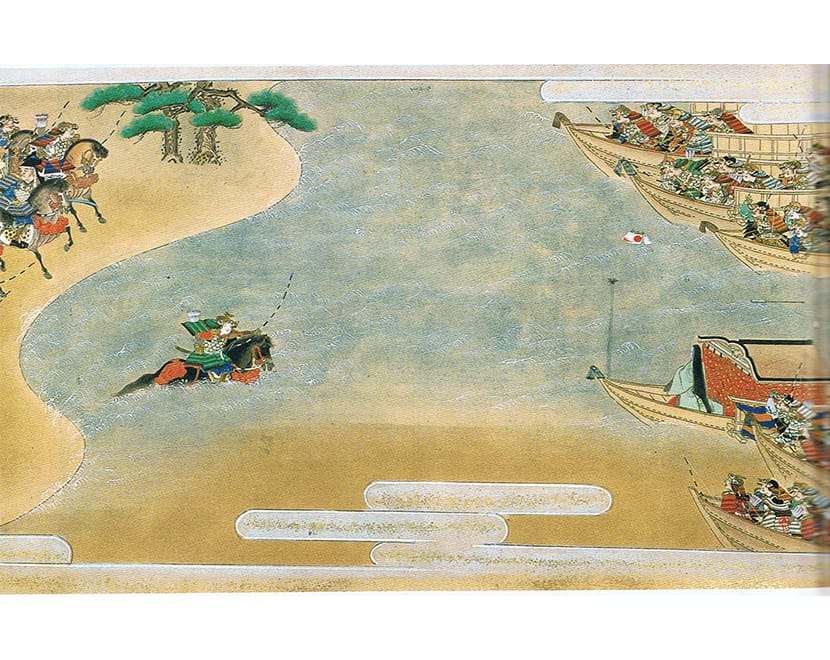
Music Notes
The episode of the remarkable arrow shot by NASU no Yoichi occupies a special position in The Tale of the Heike. It is unquestionably one of the most popular stories from this work. This may also explain why, apart from a few deviations, NASU no Yoichi is the only original in the entire biwa repertoire; that faithfully correspond to the 15th-century prose. As a result, the formal poetic line structure of 7 + 5 syllables — which is closely related to the pre-determined melodic units of chikuzen biwa — is unusual. Many lines are thus far too long or too short, which then create difficulties for the singer in achieving the melodic flow typical of the chikuzen biwa style.
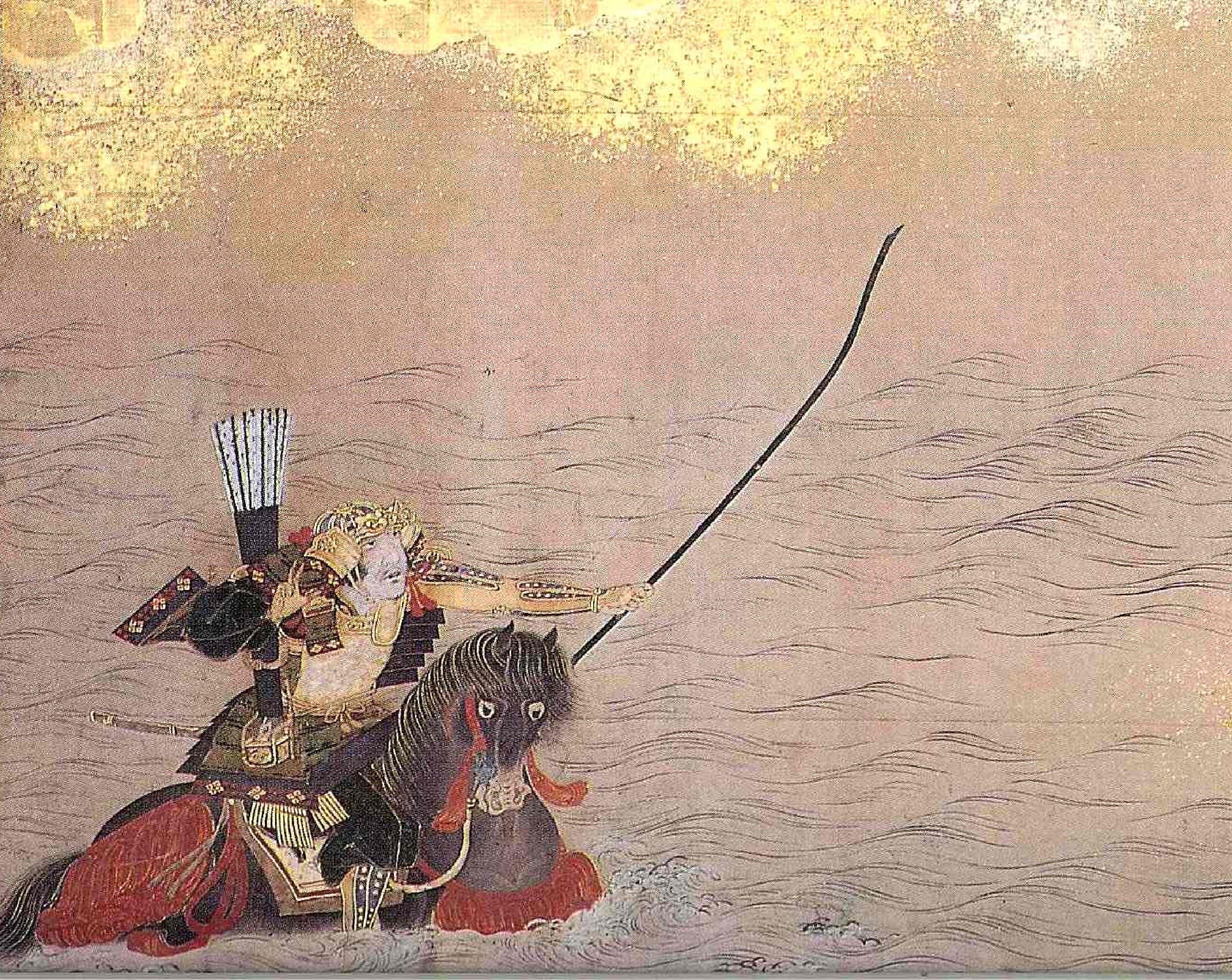
Another problem is the antiquated language seen with the verbs sōrō, tamau, and more. For the modern Japanese, their presence is the epitome of “archaic language”. Nevertheless, it is remarkable how successful the chikuzen biwa setting is. Despite the five hundred year-old text, a skillful performance renders the story readily understandable, providing the audience with pleasure.
An important reason for the popularity of this ballad is certainly the economy of the means. Since the piece is very long with a strong prose-like quality, there is more narration than singing, especially in the first half where there are also few interludes. Towards the end, however, the instrumental interludes are increasingly frequent and lavish, which makes the description of the extraordinary arrow shot a true finale. The grandiose florid interludes bChō no san, Chō no yon, Chō no roku, and the brilliant bChō otsu no ni and bChūka no ni appear in the last 20 lines, making the conclusion to this ballad in the chikuzen biwa repertoire.
The second half of the ballad is often performed as a truncated version as it allows performers ample opportunity to demonstrate their skills.
